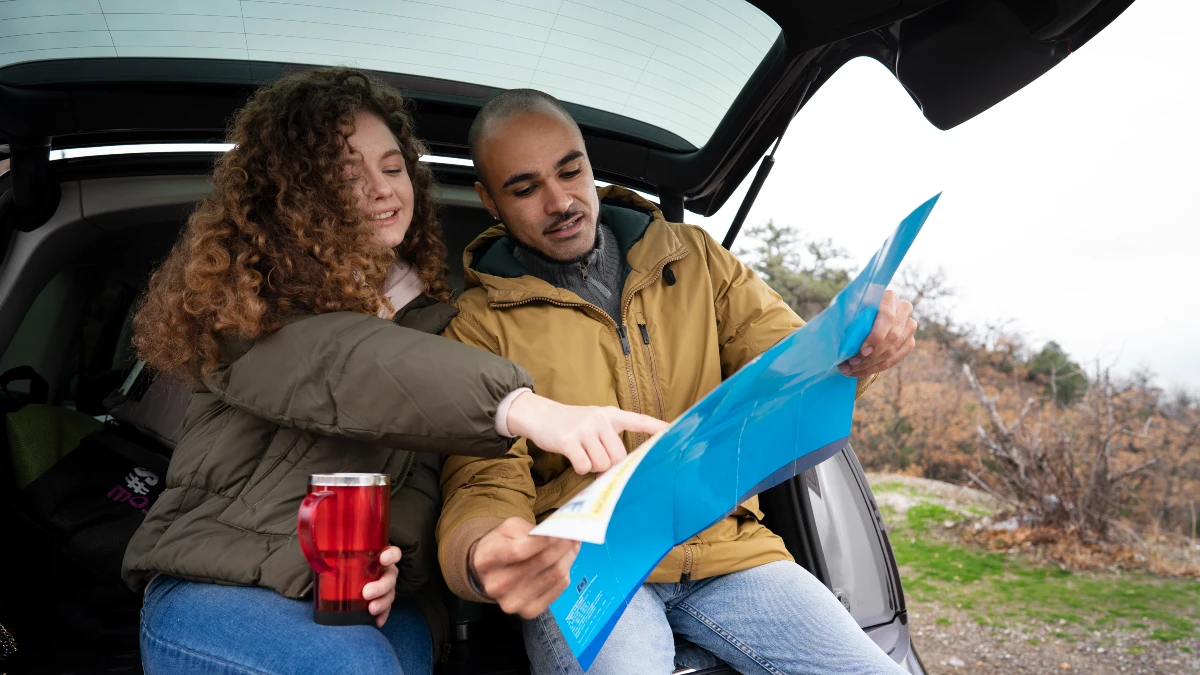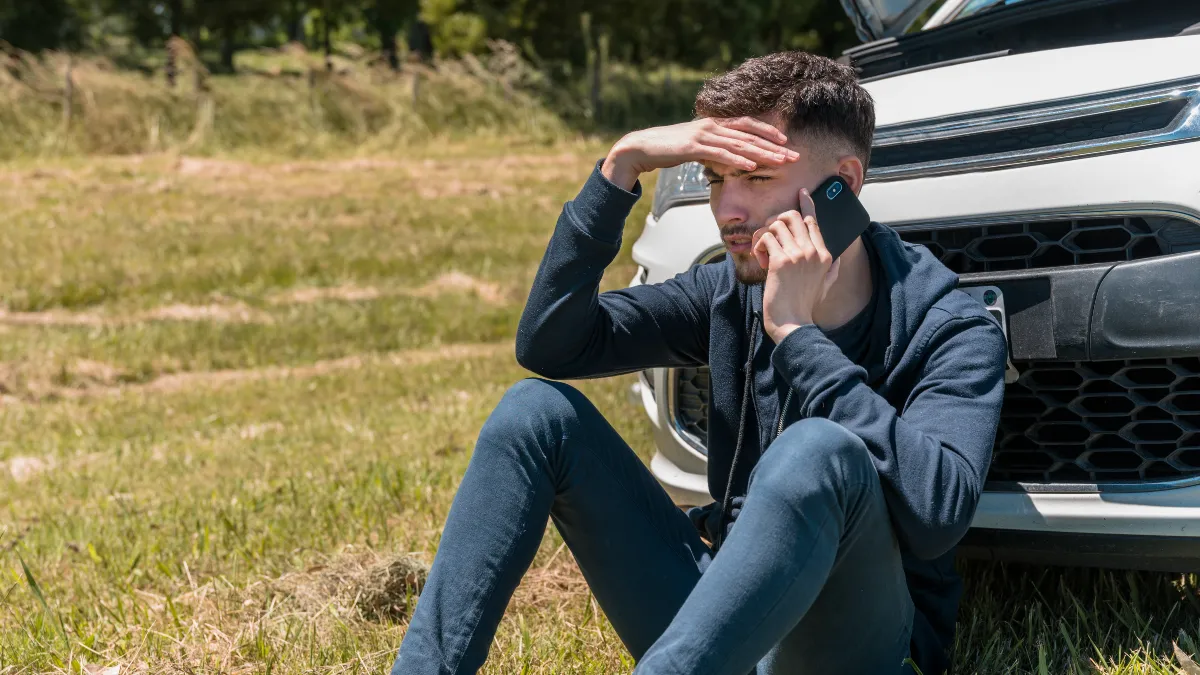Dread the stressful first hour of a road trip? The arguments, forgotten items, and instant traffic jams are all too familiar.
This chaos isn’t bad luck; it’s a predictable mistake caused by a “Scrambled Start.”
Imagine pulling away from your home feeling calm, prepared, and excited—setting a peaceful tone for your entire vacation.
Read on to discover the simple framework that guarantees your trip begins with a surplus of joy, not stress.
That Awful First Hour: Why It Always Goes Wrong

The First Hour Breakdown
A look at the pre-trip stress that fuels a chaotic start.
The Top 3 “Carguments”
23%
Argue about when and where to stop for food and bathroom breaks.
13%
Disagree over the departure time, starting the trip with tension.
12%
Clash over backseat driving, directions, and criticism of the driver.
The Domino Effect of a Rushed Start
An Expert’s Insight
“The main cause of arguments on long car trips often boils down to stress. Extended periods in a confined space, combined with fatigue, boredom, and a lack of personal space, can easily lead to irritability.”
You know the feeling. The car is packed. It took a miracle, but the cooler is in, the bags fit, and the kids are buckled. You pull away from the curb and breathe a sigh of relief. The road trip has started.
Ten minutes in, you hit a wall of red taillights. It’s the same gridlock traffic that happens every day, but you were in too much of a hurry to think about it. The gas light blinks on. In the back, you hear the first “I’m bored!” And up front, a fight starts over which way the GPS is telling you to go.
This isn’t just a bad start. It’s a sign of a bigger problem. The biggest mistake people make on a road trip isn’t forgetting a charger. It’s starting the trip already behind.
We can call this the “Scrambled Start.” It’s a shortage of time, planning, and patience that you create yourself. It happens when you treat leaving for vacation like one last chore to rush through. This way of thinking doesn’t just risk a bad first hour; it makes sure it happens. It causes a chain reaction of stress and arguments that can spoil the whole trip.
And it’s not just you. One study found that 57% of families feel stressed about their road trip before they even leave the house. The stress isn’t from the road; it’s something you pack in the car with everything else. This is what turns the first hour from fun into a total headache.
Why Little Problems Become Big Headaches

The Scrambled Start shows up in real ways during that first hour. The problems that pop up aren’t bad luck. They are the direct result of rushing out the door. When you look at what goes wrong, you see three main problems: a lack of planning, a lack of peace, and a lack of energy.
The Planning Problem (When Things Break)
This is the first thing you notice. It’s the series of “uh-oh” moments that happen when you didn’t think ahead. It’s the check-engine light that pops on 15 miles from home because nobody checked the oil. It’s digging for quarters at a cash-only toll booth while a line of cars honks behind you.
It also includes tech problems. You assume you’ll have a phone signal, but then you hit a dead zone. The GPS goes dark, and you realize you never downloaded the maps for offline use. Now you’re lost, and an argument is right around the corner.
Worst of all is not being ready for an emergency. A flat tire is annoying. But finding out your spare is also flat, you can’t find the jack, or you don’t know how to change a tire turns a 30-minute delay into a three-hour wait for a tow truck. All these problems come from the same place: you traded a few minutes of checking things for a quick getaway that wasn’t quick at all.
The Argument Problem (When People Snap)
When you put stressed-out people in a small space, the car becomes an argument box. The Scrambled Start leaves no room for patience. Small annoyances quickly turn into big fights.
Studies show what causes the most fights in the car. The number one reason, cited by 23% of people, is about stopping—when to stop, where to get food, and how long breaks should be. The next biggest fights are about what time you left and people criticizing the driver. Even the choice of music can start a huge debate.
But these fights are rarely about the music or the rest stop. A psychologist, Dr. Carolyne Keenan, says the real cause is almost always stress. On a road trip, you’re tired, bored, and have no personal space. Passengers feel like they have no control, and the driver feels all the pressure. So, the fight over the radio isn’t about the song. It’s about frayed nerves and wanting to control something—anything—in a stressful spot.
The Energy Problem (When You’re Already Tired)
The last problem is that you start the trip with an empty tank, both mentally and physically. A rushed morning doesn’t just create stress; it drains everyone’s energy.
The best example is the traffic trap. To “get going,” you leave at 5 p.m. on a Friday and drive straight into rush hour. This one mistake can add hours to your drive, kill morale, and waste gas.
Then there’s food. Forgetting to pack a cooler with snacks and drinks is a classic mistake that leads to an energy crash. When people get hungry and thirsty, they get grumpy. This forces you to make an unplanned stop at a gas station for overpriced, unhealthy food that makes everyone feel tired.
And if you have kids, a lack of entertainment is just as draining. If you don’t have playlists, podcasts, or simple games ready, the “are we there yet?” questions start right away. This makes the parents in the front seat have to be entertainers, which takes their focus off the road and uses up their limited mental energy. After one hour, the car is full of people who are not just stressed, but also worn out.
The Real Reason We Rush (And Why It Backfires)

The Scrambled Start isn’t just a bad habit. It comes from a bigger, flawed idea about travel: we focus so much on the destination that we forget about the drive to get there. We see the car ride as a chore we have to finish. This wrong idea is why we rush, cut corners, and start our trips with stress.
The “Just Get Me on the Road!” Feeling
In the hours before a road trip, a powerful feeling takes over. It’s the urge to just get on the road and escape from daily life—the chores, the emails, the to-do lists. When this feeling hits, every preparation task feels like a delay.
Checking the tire pressure is a delay. Packing snacks is a delay. Talking about the route is a delay. The only goal is to see your house in the rearview mirror. This feeling is what causes the planning, argument, and energy problems. We trade care for speed because we’ve told ourselves the vacation doesn’t start until we’re going 65 miles per hour.
The Myth of “Saving Time”
This need to escape is powered by a big lie: that a rushed start saves time. It almost always backfires and creates more delays than it prevents. The rush often comes from not realizing how long the drive will actually take.
The funny part is that rushing is what makes you late. The wallet you forgot on the counter costs you a 20-minute U-turn. Not packing snacks means a 30-minute stop at a crowded store. Trying to beat traffic leads to a speeding ticket, which costs you an hour and a lot of money. And if you skip a car check, you could break down and lose a whole day of your vacation. The time you “save” by rushing is paid back with interest through unplanned stops and stress.
Starting a Relaxing Trip with Maximum Stress
This leads to a strange situation: we start our vacations—which are supposed to reduce stress—in the most stressful way possible.
The facts show that time off is good for you. Studies show 80% of people feel a big drop in stress after a trip. Vacations are linked to better moods and a lower risk of health problems. That’s the whole point of a road trip.
But we work against that goal from the very beginning. The stress of leaving isn’t a small thing. For many, it sets a bad tone for the whole trip. By starting out scrambled, we are shooting ourselves in the foot. We put the very stress we’re trying to escape into the first moments of our escape. The only way to fix this is to change how you think. You have to see the drive as part of the vacation, not just the boring part before it.
How to Fix Your Road Trip Start: A Simple Guide

The fix for the Scrambled Start is to aim for its opposite: a “Surplus Start.” This means you begin with plenty of time, preparation, and good moods. This doesn’t happen by accident. It takes a new plan that changes how you leave for a trip. These tips will help you get the work done early and have a calm, happy first hour.
The 48-Hour Rule: Do Everything Early
The secret to a calm departure day is to have almost nothing to do on that day. By adopting the “48-Hour Rule,” you can move all the significant tasks to the two days before you leave. This method effectively gets rid of the last-minute rush and makes the start of your trip feel easy and organized.
Two days before you leave, focus on the major preparations. For your car, check the oil, all other fluids, and the tire pressure (including the spare!), and get any needed maintenance done. This is also the time to handle your money and paperwork by notifying your bank of your travel, confirming any hotel bookings, and making digital copies of your license and registration.
For tech, download offline maps for your entire route and preload any playlists, podcasts, or audiobooks for the first day. You should also do your main grocery shopping for all road trip snacks and drinks. Finally, take care of your house by arranging for mail and pet care and tidying up so you don’t return to a mess.
The night before your departure is all about final staging. Fill up your car’s gas tank and give the inside a quick clean-out to save you a stop on your first day. Gather your essential documents and money, getting some cash for tolls or small stops and placing your license, registration, and roadside assistance card somewhere easy to grab.
Pack your cooler, and make a separate small bag with “first-hour snacks” that’s within reach. Fully charge all your electronics—phones, tablets, and power banks—and make sure your phone mount and chargers are already in the car and working.
Lastly, pack your final bags and do a final check of the house to ensure windows are locked and appliances are off.
Plan Your First Hour Like It’s Part of the Fun
Instead of letting the first hour be a mess, plan it out. This turns leaving from a scramble into a nice ritual. It shows that the drive itself has value.
- 5 Minutes Before You Go: The navigator loads the route and makes sure the offline maps are working. The driver starts the pre-made “First Hour Playlist”. This gets rid of two common arguments before you even move.
- When You Start Driving: The trip begins calmly. The focus is on the road, not on last-minute problems.
- 30 Minutes In: The passenger hands out a planned snack from the easy-to-reach bag. This isn’t a reaction to someone being hungry; it’s a planned move to keep energy and moods up.
- Your First Stop (After 1 Hour): Plan a short, required stop about an hour into the drive. Don’t make it a gas station. Find a scenic view, a small park, or a clean rest area. This is a mental reset that lets everyone stretch. It reinforces the idea that the drive is part of the fun.
The 5-Minute Pre-Trip Chat
This last step fixes the argument problem. It’s a quick, 15-minute talk the night before you leave. This meeting helps stop fights before they start by setting clear rules that everyone agrees on. Talking things out beforehand is the best way to prevent fights on the road.
Here’s what to talk about:
- Stops: “Let’s plan to stop every two hours for 15 minutes. Does that sound good to everyone?” This handles the #1 cause of fights.
- Driving: “I’ll drive the first three hours, then we can switch. Is that fair?” This shares the work and stops the driver from getting too tired.
- Music: “How about the driver gets to pick the music for their turn? We can agree on that?” This simple rule prevents the music wars.
- Money: “Just so we’re on the same page, our budget for food each day is $X. Let’s try to stick to it.” This avoids money stress later.
This short chat isn’t about being rigid. It’s about making sure everyone is on the same page. When you agree on these things ahead of time, they won’t become a reason to fight later.
Your Vacation Starts in the Driveway

The first hour of a road trip sets the tone for everything that follows. A chaotic, stressful start isn’t something you have to put up with. It’s the result of one mistake you can fix: starting your trip from a scrambled state.
By changing your approach, you can take back that first hour. The fix is to switch to a “Surplus Start”—a surplus of time, planning, and good feelings. This isn’t about adding more work. It’s about doing the work earlier to create calm instead of chaos.
When you do this, you are saying that your time is valuable. You are choosing to believe that your vacation doesn’t start when you get to your destination, tired and stressed. It starts the moment you get in your well-prepared car and pull away from the curb, feeling peaceful, in control, and excited for what’s ahead. Your vacation starts now.
Conclusion
The first hour of your road trip doesn’t have to be a disaster. For too many of us, it’s a time filled with traffic, arguments, and stress. We’ve come to accept this chaotic start as normal, but it’s not just bad luck.
It’s the direct result of a single, fixable mistake: rushing out the door and treating the drive like a chore instead of the first part of the vacation. This “Scrambled Start” sets a negative tone that can linger for the whole trip, turning a fun adventure into a frustrating task.
The good news is that you can completely change this experience. The solution is to aim for a “Surplus Start”—beginning your trip with plenty of time, solid planning, and a calm attitude. This means doing the work ahead of time with the 48-hour rule, so your departure day is easy.
It means planning your first hour with a set playlist and a scheduled first stop, so there are no surprises. And it means having a quick chat the night before to agree on the rules of the road. These steps aren’t about adding more work; they’re about shifting the work so you can actually relax.


